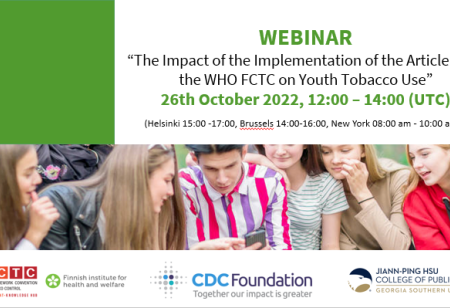

Second webinar of the series: monitoring of tobacco use and exposure and the consequences of tobacco consumption
The second webinar of the series on supporting low and middle income countries in the establishment of tobacco surveillance systems in line with the Article 20 of the WHO FCTC takes place on October 26 at 12:00 UTC (check your local time from here).
The focus of the webinar is on monitoring of tobacco use and exposure and the consequences of tobacco consumption. The flyer of the second webinar can be downloaded here.
Registration for the webinars is open through this link.
Recordings of all presentations will be available on the website of the Knowledge Hub on Surveillance shortly after the webinar.
Titles of the presentations
Dr. Corinne M. Graffunder: “U.S. Centers for Disease Control and Prevention Global Tobacco Surveillance System: Status and future directions”
Ms. Jane Henley: “Monitoring the health consequences of tobacco use”
Speakers of the webinar

Corinne M. Graffunder, DrPH, MPH
Centers for Disease Control and Prevention
Dr. Corinne Graffunder is Director of the U.S. Centers for Disease Control and Prevention (CDC) Office on Smoking and Health within the National Center for Chronic Disease Prevention and Health Promotion.
Dr. Graffunder joined the CDC in 1987 and has 30+ years of experience working with Global, National, State and local prevention efforts. She is responsible for providing broad leadership and direction for all scientific, policy, communication and programmatic issues related to tobacco prevention and control.
Dr. Graffunder’s expertise is in policy development, program management, strategic planning, and public and partner communication. She has subject matter expertise in prevention strategies, population health and health system transformation, focusing on a wide range of fields including tobacco use prevention and control, the prevention of violence and the prevention of non-communicable diseases, particularly cardiovascular disease and cancer. Her expertise is the application of evidence and research to practice and programs.
Prior to joining the Office on Smoking and Health, she held the position of Deputy Associate Director for Policy in CDC’s Office of the Director. In this position she worked with the U.S. Surgeon General, leading the development of the first ever National Prevention Strategy: America’s Plan for Better Health and Wellness. She also worked to strengthen collaboration between public health, health care, and other sectors playing a key role in advancing CDC’s population health priorities.
She received her doctorate from the University of North Carolina, Department of Health Policy and Management.

Jane Henley, MSPH
Centers for Disease Control and Prevention
Jane Henley is an epidemiologist in the Cancer Surveillance Branch in the Division of Cancer Prevention and Control at the Centers for Disease Control and Prevention (CDC). Ms. Henley joined the CDC in 2010 and uses data from CDC’s National Program of Cancer Registries and other surveillance systems to monitor cancer outcomes.
Before coming to CDC, she worked as an epidemiologist at the American Cancer Society in the analytic epidemiology program and conducted analyses using data from the Cancer Prevention Study cohorts.
Her research interests include surveillance of cancers linked to modifiable risk factors, including tobacco use, alcohol use, physical activity, and obesity. She has contributed to more than 100 journal articles and book chapters, including publications about cancer surveillance; lung cancer and other tobacco-related cancers; health consequences of cigarette, cigar, pipe, and smokeless tobacco use; and health benefits of smoking cessation.
She has lectured on lung cancer and smoking at the Morehouse School of Medicine and the use of population-based cancer registry data in cancer prevention and control among LMIC at Emory University.
Ms. Henley earned an undergraduate degree in statistics from Mount Holyoke College and a master of science in public health in biostatistics from the Rollins School of Public Health, Emory University.
This activity is carried out from a grant provided by the Government of Norway, through the Secretariat of the WHO Framework Convention on Tobacco Control (WHO FCTC), and from a grant provided by the Finnish Ministry of Social Affairs and Health.





